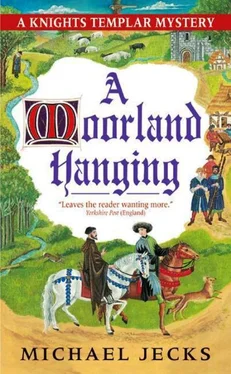“We must question him at some point. It might as well be now,” said Baldwin, setting off for the hall.
Inside, the old knight and his wife were resting in front of the fire. Simon could see how exhausted Sir William was when he raised his eyes to the four men. “Bailiff, Sir Baldwin – please come in and have some wine.”
“Thank you,” Simon said, reaching forward to take the proffered goblet, then settling on his bench. Baldwin sat beside him, while Edgar and Hugh took their seats unobtrusively some feet behind.
“Have you had a useful morning?” asked Matillida Beauscyr graciously, and Baldwin smiled at her as he sipped some wine.
“Very, thank you,” he said. “Yes, we have been to see Thomas Smyth, and the miners’ camp. And, tell me: we saw a man on the moors near your mining camp with cattle. Are there many who use the moors for pasture?”
Sir William nodded. “There are some. It’s not the same as it used to be before the famine – then we had five thousand head or more, but there’s less than half that number now… But there are still some farmers who use their rights of pasturage. The man you saw was probably Adam Coyt. He lives over west of here. I think he’s been on the moors all his life, which has been a hard one. His wife and son are both dead, and he’s kept his little farm going alone ever since.
Baldwin said, “It must be hard for a man like him. Working all alone, and with no one to leave it to.”
“It happens all too often, I fear,” Sir William sighed. “The moors are harsh on all those who choose to live here. To be a moorman you must be as hard as the moorstone itself.”
“But your Manor is not like that!” Simon protested. “It is successful, with good crops and growing herds.” As bailiff, he knew; he saw the records of production each year. Sir William shot him a glance as if expecting an immediate tax increase.
“We have been lucky so far, bailiff. Luckier than some,” he admitted heavily.
“You must be glad you have two strong sons to leave all this to,” Baldwin continued.
“Of course. It would be difficult if I had no heirs,” and Sir William shrugged.
Baldwin did not meet his look. “Thomas Smyth has no son, does he? Could you tell us anything about him?”
Sir William stared at the fire for a moment. “I should have thought,” he said dryly, “you could have found out all you needed to know from the man himself while you were with him. Anyhow, he is not a local man, as you probably guessed. I think he came from the north somewhere, and moved here back in ’86 or ’87. He was only a lad then, of course, but enthusiastic. Well, he began mining and was lucky. Many men go for ages without finding anything, but he was one of the fortunate ones. He happened on a piece of land which bore a good quantity of metal, and he was shrewd with it, getting other men to look after it for wages while he searched for more. Soon he was not satisfied with just finding tin. He had to aim for better, more efficient ways of refining it. Most men are pleased to find tin and smelt it once, but not he.”
“Smelt it once?” asked Baldwin. It was Simon who answered, resting his elbows on his knees.
“There is a first and a second smelting, Baldwin. When miners find ore, they break it into small chunks and melt out the tin over their fires. That’s called ‘first smelting.’ There are lots of impurities in it from the charcoal and other rubbish, so it has to be smelted again to produce ‘white tin,’ which is clean enough to be coined at the stannary towns.”
“I see. And Smyth was not satisfied with that?”
Sir William gave a sour grin. “Oh no, not old Thomas. He’s too sharp. He had to build his own blowing-house. The furnace is so clean he can smelt tin faster and recover even more, and it’s all white tin. There’s hardly any dirt mixed with it. He can produce as much as he wants, and smelt other men’s metal too, so he charges them to use his fires, and that makes him even more powerful here.”
Simon stated the obvious inference. “You do not like him Sir William.”
“I do not. It is wrong for a man like him to be able to live like a lord. He is only a commoner – I don’t even know if he’s a free man. He could well be another runaway peasant like Bruther, someone who managed to escape to the moors. Just because he has accumulated money does not make him any better.”
“He told us you were with him on the night that Peter Bruther died. What were you doing there if you dislike him so much?”
Sir William stared at him, anger flaring briefly, only to be washed away by a kind of tired acceptance. “For a guest you are very inquisitive, bailiff,” he sighed. “No matter. I was negotiating: I was there to agree terms with him so that he would not damage my lands.”
“So you went to pay him not to come here?”
“Yes. If I didn’t, he promised a small army of miners, taking my water, digging on my pastures, and cutting down my trees for charcoal. They have the right, after all. We settled on a sum.”
“I see. The men who found the body, they were riding with you, were they not?”
“Yes. But I sent them off before I went in to speak to Smyth.”
“Why?”
“I wanted to talk to him without two inquisitive men-at-arms listening.”
“Were you alone with Smyth for the discussion?”
“Apart from his man, George Harang.”
“You had no men with you?” Simon’s voice was openly amazed.
Sir William looked up, frowning. “And who should I have had with me, bailiff? A son like Robert, who loathed the fact that I must negotiate with a blackmailer? Or perhaps John and his master, who travelled with me, but… Ha! Each would prefer to slice his own throat than deal with a commoner. They left me when we arrived at the miner’s house. I sent the men-at-arms back so they would not hear what I was there to discuss with Smyth. How could I let one of my guards hear that kind of talk? It would take no time at all for news to travel all round this fort that I, the master of the Manor, was being threatened by a common tinner and forced to pay up. How could the men here respect me if they heard that?”
His wife put her hand on his shoulder and William gradually subsided, sinking back into his chair exhausted. Surely, he thought, the bailiff must understand. A fortress like this was only as strong as the men inside it. If the guards all felt unsure of their master, they might run off and desert him or, worse, decide that he was too old for his responsibilities. Weak lords did not live long – there was always someone prepared to organize a mutiny among the common guards. It was not like the old times when honorable men worked for their master for life; now castles like Beauscyr had to rely on hirelings, on paid mercenaries. That was why this castle, like so many other new ones, had dormitories for the men-at-arms separated from the solar where the family lived. In the past all would have slept in the same hall, but mercenaries were not to be so well-trusted as guards, and it was not rare for a lord to find himself having to fight his own men, defending his solar from the very soldiers he had trained for war. Surely, the bailiff could understand that, too?
His wife looked at Simon coldly. “Is it not enough that we must demean ourselves in front of this miner? Do you have to rake this up and embarrass us with it?”
“I am sorry, my lady, but though Peter Bruther was only a villein, it does seem he was murdered, and we must ask everyone who could have been involved.”
“Who could have been involved? Are you saying that you suspect my husband of involvement?” Her brows rose in angry disgust. “I do not wish to hear more, sir. You are our guests, but there is no need for us to accept insults. I would like to be left alone, now. Please leave us.”
Читать дальше












